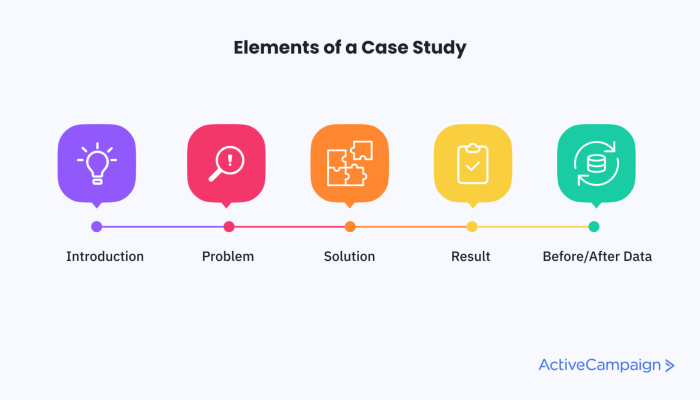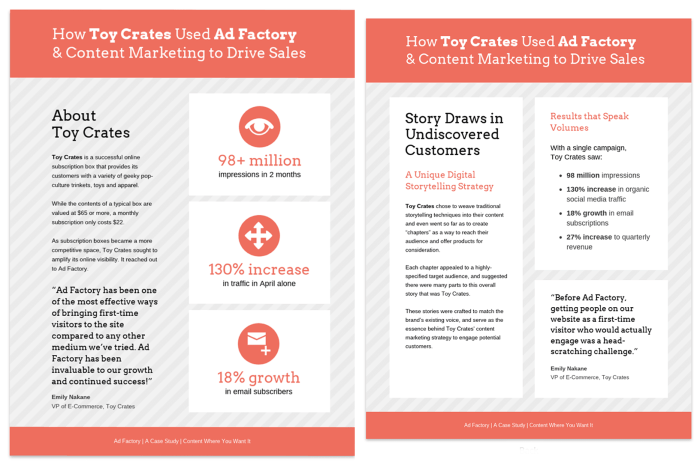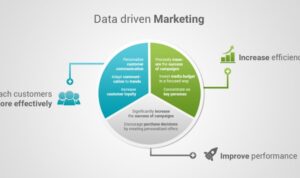Marketing with Case Studies sets the stage for this enthralling narrative, offering readers a glimpse into a story that is rich in detail with American high school hip style and brimming with originality from the outset.
Case studies are powerful tools that allow businesses to highlight their achievements and build trust with potential customers. This guide will delve into the importance of case studies in marketing and how they can be leveraged for maximum impact.
Importance of Marketing with Case Studies

Case studies play a crucial role in marketing strategies, providing businesses with a powerful tool to showcase their success stories and achievements. By presenting real-life examples of how their products or services have helped customers overcome challenges and achieve their goals, businesses can build credibility and trust with potential customers. Let’s dive deeper into the benefits of using case studies in marketing.
Benefits of Using Case Studies
- Case studies provide tangible evidence of a business’s capabilities and the results they can deliver.
- They offer a detailed look at how a product or service solved a specific problem for a customer, making it easier for potential clients to envision the benefits for themselves.
- Case studies can be shared across multiple channels, from websites to social media, increasing brand visibility and attracting new leads.
Showcasing Success Stories
- Through case studies, businesses can highlight their most successful projects and demonstrate their expertise in a particular industry or niche.
- By showcasing real-world examples of satisfied customers, businesses can attract new clients who are looking for proof of the value they provide.
- Case studies act as a powerful form of social proof, showing potential customers that others have benefited from the business’s offerings.
Building Credibility and Trust
- Customers are more likely to trust a business that can provide concrete examples of how they have helped similar clients in the past.
- Case studies create a sense of transparency and authenticity, as they demonstrate the real impact of a business’s products or services.
- Building a library of case studies can strengthen a business’s reputation and position them as a trusted authority in their field.
Creating Compelling Case Studies

To create compelling case studies, it’s essential to structure them in a way that maximizes impact and engagement. Here are some tips and examples to help you create effective case studies:
Tips for Structuring a Case Study
- Start with a captivating title that highlights the main problem or success story.
- Provide a brief overview of the client or company featured in the case study.
- Clearly Artikel the challenges or goals that were addressed.
- Include real data and statistics to support the results and outcomes.
- Incorporate testimonials from clients or stakeholders to add credibility.
- Use visuals such as charts, graphs, or infographics to make the case study more engaging.
Engaging Formats for Presenting Case Studies
- Video Case Studies: Create compelling videos that showcase the client’s story and results.
- Written Case Studies: Provide detailed written content with a clear structure and formatting.
- Infographic Case Studies: Use visual representations to highlight key points and data.
Importance of Real Data, Testimonials, and Visuals
- Real Data: Numbers and statistics provide credibility and evidence of success.
- Testimonials: Quotes and feedback from clients add a personal touch and validation.
- Visuals: Charts, graphs, and images help to break up text and make the case study more visually appealing.
Leveraging Case Studies in Marketing Campaigns
Case studies can be powerful tools in marketing campaigns, showcasing real-world examples of successful outcomes that resonate with potential customers. By incorporating case studies into various marketing channels and promoting them effectively, businesses can boost their lead generation and conversion rates.
Incorporating Case Studies into Marketing Channels
Case studies can be strategically integrated into different marketing channels to maximize their impact:
- Share case studies on social media platforms to engage with a wider audience. Use visually appealing graphics and compelling storytelling to capture attention.
- Include case studies in email marketing campaigns to provide valuable content to subscribers. Personalize the content based on the recipient’s interests and pain points.
- Showcase case studies on the company website to build credibility and trust. Make them easily accessible and highlight key takeaways for visitors.
Promoting Case Studies for Reach
Effective promotion is key to ensuring that case studies reach a wider audience and drive engagement:
- Utilize targeted advertising to promote case studies to specific demographics or segments most likely to convert.
- Collaborate with industry influencers or partners to share case studies with their followers and amplify the reach.
- Optimize for case study content to increase visibility in search engine results and attract organic traffic.
Utilizing Case Studies for Lead Generation and Conversion Optimization
Case studies play a crucial role in generating leads and optimizing conversion rates:
- Use case studies as lead magnets by offering them as downloadable content in exchange for contact information.
- Feature customer testimonials and success stories in case studies to build trust and credibility with potential customers.
- Analyze data from case studies to identify patterns and insights that can inform marketing strategies and improve conversion optimization.
Analyzing the ROI of Marketing with Case Studies
When it comes to measuring the return on investment (ROI) of using case studies in marketing campaigns, there are several key factors to consider. By tracking specific metrics and analyzing the long-term benefits, businesses can determine the effectiveness of their case study efforts.
Measuring Effectiveness of Case Studies
- Track conversion rates: Monitor how many leads generated from case studies actually convert into customers.
- Assess engagement: Measure the level of engagement with the case study content, such as time spent on page, social shares, and comments.
- Evaluate brand awareness: Analyze any increase in brand visibility or recognition as a result of the case studies.
Key Metrics to Track
- Cost per lead: Calculate the cost of acquiring a lead through case study marketing efforts.
- Customer acquisition cost: Determine how much it costs to acquire a new customer through case study campaigns.
- Customer lifetime value: Understand the long-term value of customers acquired through case studies.
Long-term Benefits of Case Studies, Marketing with Case Studies
- Build trust and credibility: Case studies showcase real success stories, helping to establish trust with potential customers.
- Drive conversions: Compelling case studies can influence purchasing decisions and drive more conversions.
- Generate valuable insights: Analyzing case study performance can provide valuable insights for future marketing strategies.

